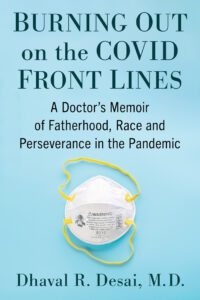Emory doctor’s book focuses on mental health.

Dr. Dhaval Desai realized something wasn’t quite right in the summer of 2020 when he found himself not wanting to help his daughter learn to ride a two-wheeler.
“I just wanted to finish the evening grind with the kids and lie down on the couch,” says the Sandy Springs native. “I can remember faking feeling any joy when she did it. I had enough insight to know something was wrong that I wasn’t excited to be in the moment.”
That disconnected feeling was more the result of a long day as the director of hospital medicine at Emory Saint Joseph’s. It was just a few months into the pandemic, and Desai and his colleagues were already exhausted.
“I’ve always enjoyed sharing that frontline perspective, especially when it comes to the patient experience, but we were thrown into the fire,” he says. “Burnout has been an ongoing issue, and that can lead to compassion fatigue.”
Added to the COVID crisis was Desai’s having become a dad for the second time just two weeks before the world shut down. “As a doctor, a father and husband, I came to a point where I was struggling with mental health.”
 One of Desai’s therapeutic tactics was to write honestly about his experiences, and at the same time, tell the story in a way that portrayed health care workers as human beings. The result is Burning Out on the COVID Front Lines: A Doctor’s Memoir of Fatherhood, Race and Perseverance in the Pandemic.
One of Desai’s therapeutic tactics was to write honestly about his experiences, and at the same time, tell the story in a way that portrayed health care workers as human beings. The result is Burning Out on the COVID Front Lines: A Doctor’s Memoir of Fatherhood, Race and Perseverance in the Pandemic.
“A lot of us forget what we went through; all we all remember is seeing pictures of those terrible hospital scenes in New York,” he says. “We forget that health care workers are human beings, but with so much work to do, it takes us away from the mission we signed up for.”
The two-year project of writing his first book gave Desai the chance to examine his own experiences and to encourage others from any walk of life who are struggling with mental health issues to find the support they need.
“I want the major takeaway to be that it’s OK to not be OK,” he says. “You can be highly functional and still not be OK. About 400 physicians a year die by suicide, and that should not happen.”
Desai points to the case of Dr. Lorna Breen, a New York physician who committed suicide in 2020 after battling the pandemic’s demands and her own case of COVID. All proceeds from the book will go to the foundation named for her that works to raise awareness of mental health issues and reduce their stigma in the medical community. Desai himself admits to feeling vulnerable while writing the book.
“But there are so many people out there like me who may not recognize their own vulnerability or do anything about it,” he says. “I talk about how I came through it and how I’m so much better. I was never suicidal, but I had a dark cloud over me. I’m grateful I can share my voice so others can be on that journey, too.”
Desai, who also teaches at Emory’s medical school, adds a warning about the current state of the health care system as well. “It’s very fragile,” he says. “But we also need to think about preventative care to make sure we have a stable system we can depend on. I’m not sure we can sustain another pandemic.”
dhavaldesaimd.com
@doctordesaimd
Atlanta-based writer and editor contributing to a number of local and state-wide publications. Instructor in Georgia State’s Communication department and Emory’s Continuing Education division.











